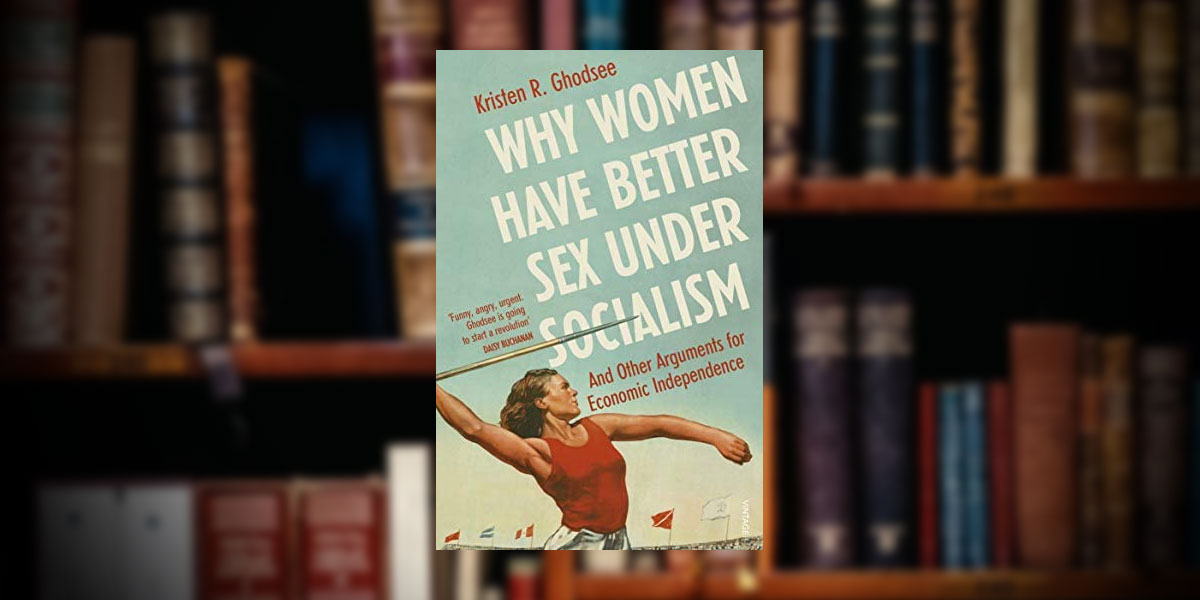Everyone should be empowered to craft a life of their choosing.
Do the conditions for this differ for men and women? The provocatively titled “Why Women Have Better Sex Under Socialism” suggests that government must help women.
Recent voting patterns suggest that American women increasingly believe this.
Professor Kristen Ghodsee of the University of Pennsylvania authored the provocative book. Despite the title, the book builds off her research on women in Bulgaria following the collapse of communism and explores how economic independence affects women and marriage.
Economic independence certainly empowers people. And economic dependence is a poor basis for marriage.
No woman should feel compelled to stay in a terrible marriage to afford food and shelter. And as Professor Ghodsee observes, men often find marriages based on economic dependence unfulfilling.
But is government the path to independence? I contend it is economic freedom, which has in America eliminated legal barriers for women in work, contracting, and ownership. Markets emphasize evaluating workers and products based on their merits and performance, not gender. Government can provide transfers and a safety net.
Yet dependence on government is still dependence.
The Soviet Union illustrates the perils of government “empowerment.” The regime controlled everyone, male and female. Soviet leaders commanded women to work in factories and offices to hasten industrialization. As a by-product, women gained independence from husbands.
But Soviet leaders could have ordered women to stay home and raise children.
Professor Ghodsee acknowledges this: “In no country were women’s rights promoted as a project to support women’s individualism and self-actualization.”
The professor prefers the entitlements of Scandinavian democratic socialism.
Indeed, she even attributes the failures of a pickup artist in Denmark to their economic
independence. As an aside, Scandinavian countries are better described as market economies with high levels of government spending.
Still, government provision of many life necessities means women need not rely on benefits from a husband’s job.
Unmarried women in America seem to embrace this as well. Joel Kotkin and Samuel Abrams report in “The Rise of the Single Woke Female” (SWF) that single adult women voted 68 percent Democratic in 2022. This demographic stemmed the red wave. Undoubtedly abortion impacted 2022 votes, but only accelerated the trend.
Kotkin and Abrams offer Taylor Swift as an exemplar of SWF. Yet Ms. Swift has succeeded on her talent and drive, not government assistance. With an estimated net worth of $570 million before her Eras Tour, Ms. Swift should presumably vote for low taxes, not a party questioning whether billionaires (whose ranks she will likely soon join) should exist.
The SWFs are predominantly urban, college educated professionals with presumably good paying jobs and decent benefits. They do not need free stuff from government, while government policies make their housing, healthcare, and daycare unnecessarily expensive. More economic freedom would seemingly improve their lives.
Two factors that may explain this left-leaning political orientation. Feminist scholars rarely recognize spontaneous order, or the emergence of institutions in society from human action but not human design. An analysis of patriarchy omitting spontaneous order will see a system designed to subjugate women. Government provides relief from an exploitative system.
Historical poverty also matters. The Great Enrichment began around 1700 and lifted the average person above the subsistence level for the first time. Social and legal customs maintaining families appear cruel to women in hindsight intentionally but merely reflected harsh economic realities. The Great Enrichment – enabled by economic freedom – has helped liberate women.
The complexity of society means that customs and government policies can have unintended and unexpected consequences, sometimes compromising women’s economic independence. Professor Ghodsee identifies one. When women do not work outside the home, they do not contribute to Social Security. Without her own retirement income, a woman may be stuck in a bad marriage.
We should address such barriers when identified. Proponents of economic freedom should perhaps also devote more attention to ensuring that all people develop agency to act on freedom. But economic freedom offers the best path to economic independence – from a spouse or the government.
Daniel Sutter is the Charles G. Koch Professor of Economics with the Manuel H.
Johnson Center for Political Economy at Troy University and host of Econversations on
TrojanVision. The opinions expressed in this column are the author’s and do not
necessarily reflect the views of Troy University.










